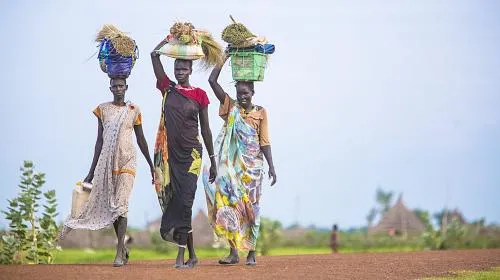JUBA, South Sudan. (Feb. 2, 2015) — CARE welcomes the signing of the ceasefire between the government and opposition forces in South Sudan. The ceasefire, signed in Ethiopia yesterday, commits both parties to ending a conflict that has wreaked havoc on the world’s newest nation since December 2013.
“We’re cautiously optimistic,” said Aimee Ansari, CARE South Sudan’s country director. “This isn’t the first ceasefire signed by the conflicting parties, but we’re hoping it’s the last.
“The people of South Sudan need demonstration of a commitment to investment in the future of all its people. We’re looking forward to a comprehensive peace settlement to be agreed at the next round of talks later this month that will lay the foundation for this country to start rebuilding.
“Right now, we’re in the middle of the dry season. People’s coping mechanisms have been further eroded from last year,” said Ansari. “The disruption of people’s lives and livelihoods caused by this conflict, combined with the disruption of normal markets and food distribution systems, has left much of the population in extremely vulnerable conditions.”
Since the conflict began, more than 1.5 million people have been forced to flee their homes, including more than 400,000 people who are refugees in neighboring countries.
Women and girls constitute a large proportion of those affected. Sexual violence has increased dramatically. Even before the crisis, one in seven mothers died from pregnancy and birth-related complications.
Children have been separated from their families during the fighting, or one or both parents have been killed, or fathers have left the family to go fight. Many children have walked vast distances, without adult supervision, in order to reach safety.
In 2014, CARE assisted more than 570,000 South Sudanese affected by the conflict. CARE is providing emergency water, sanitation, hygiene services and education, in addition to nutrition and livelihoods assistance. CARE also supports more than 40 health facilities in Unity and Upper Nile States, two of the states most heavily affected by fighting.
CARE has been operating in Southern Sudan since 1993, initially providing humanitarian relief to internally displaced people in Western Equatoria. The signing of the Comprehensive Peace Agreement in 2005 allowed CARE to expand into Jonglei and Upper Nile States to support returnees from the refugee camps, and the organization has since broadened its operations to include development programs.
About CARE:
Founded in 1945, CARE is a leading humanitarian organization fighting global poverty. CARE has more than six decades of experience helping people prepare for disasters, providing lifesaving assistance when a crisis hits, and helping communities recover after the emergency has passed. CARE places special focus on women and children, who are often disproportionately affected by disasters. To learn more, visit www.care.org.
Media Contacts:
Nicole Harris, nharris@care.org, +1 404 979 9503
Brian Feagans, bfeagans@care.org, +1 404-979-9453

